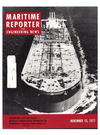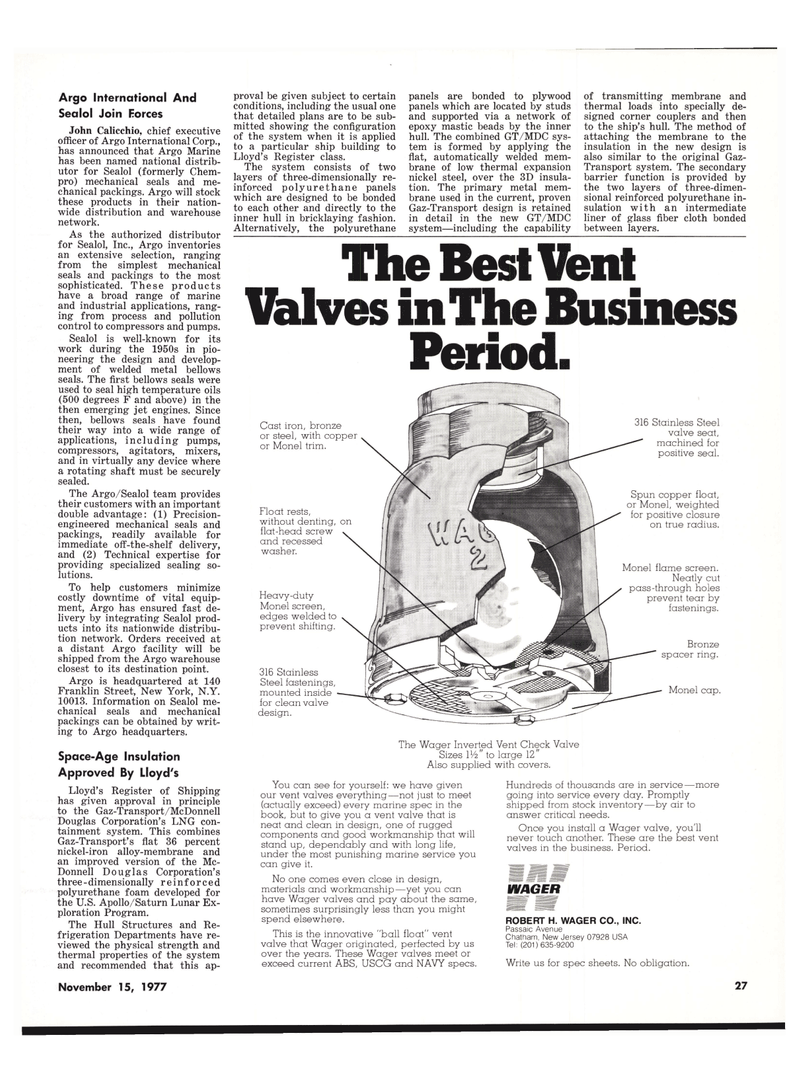
Page 25: of Maritime Reporter Magazine (November 15, 1977)
Read this page in Pdf, Flash or Html5 edition of November 15, 1977 Maritime Reporter Magazine
Argo International And
Sealol Join Forces
John Calicchio, chief executive officer of Argo International Corp., has announced that Argo Marine has been named national distrib- utor for Sealol (formerly Chem- pro) mechanical seals and me- chanical packings. Argo will stock these products in their nation- wide distribution and warehouse network.
As the authorized distributor for Sealol, Inc., Argo inventories an extensive selection, ranging from the simplest mechanical seals and packings to the most sophisticated. These products have a broad range of marine and industrial applications, rang- ing from process and pollution control to compressors and pumps.
Sealol is well-known for its work during the 1950s in pio- neering the design and develop- ment of welded metal bellows seals. The first bellows seals were used to seal high temperature oils (500 degrees F and above) in the then emerging jet engines. Since then, bellows seals have found their way into a wide range of applications, including pumps, compressors, agitators, mixers, and in virtually any device where a rotating shaft must be securely sealed.
The Argo/Sealol team provides their customers with an important double advantage: (1) Precision- engineered mechanical seals and packings, readily available for immediate off-the-shelf delivery, and (2) Technical expertise for providing specialized sealing so- lutions.
To help customers minimize costly downtime of vital equip- ment, Argo has ensured fast de- livery by integrating Sealol prod- ucts into its nationwide distribu- tion network. Orders received at a distant Argo facility will be shipped from the Argo warehouse closest to its destination point.
Argo is headquartered at 140
Franklin Street, New York, N.Y. 10013. Information on Sealol me- chanical seals and mechanical packings can be obtained by writ- ing to Argo headquarters.
Space-Age Insulation
Approved By Lloyd's
Lloyd's Register of Shipping has given approval in principle to the Gaz-Transport/McDonnell
Douglas Corporation's LNG con- tainment system. This combines
Gaz-Transport's flat 36 percent nickel-iron alloy-membrane and an improved version of the Mc-
Donnell Douglas Corporation's three-dimensionally reinforced polyurethane foam developed for the U.S. Apollo/Saturn Lunar Ex- ploration Program.
The Hull Structures and Re- frigeration Departments have re- viewed the physical strength and thermal properties of the system and recommended that this ap- proval be given subject to certain conditions, including the usual one that detailed plans are to be sub- mitted showing the configuration of the system when it is applied to a particular ship building to
Lloyd's Register class.
The system consists of two layers of three-dimensionally re- inforced polyurethane panels which are designed to be bonded to each other and directly to the inner hull in bricklaying fashion.
Alternatively, the polyurethane panels are bonded to plywood panels which are located by studs and supported via a network of epoxy mastic beads by the inner hull. The combined GT/MDC sys- tem is formed by applying the flat, automatically welded mem- brane of low thermal expansion nickel steel, over the 3D insula- tion. The primary metal mem- brane used in the current, proven
Gaz-Transport design is retained in detail in the new GT/MDC system—including the capability
The Wager Inverted Vent Check Valve
Sizes IV2" to large 12"
Also supplied with covers. of transmitting membrane and thermal loads into specially de- signed corner couplers and then to the ship's hull. The method of attaching the membrane to the insulation in the new design is also similar to the original Gaz-
Transport system. The secondary barrier function is provided by the two layers of three-dimen- sional reinforced polyurethane in- sulation with an intermediate liner of glass fiber cloth bonded between layers.
You can see for yourself: we have given our vent valves everything—not just to meet (actually exceed) every marine spec in the book, but to give you a vent valve that is neat and clean in design, one of rugged components and good workmanship that will stand up, dependably and with long life, under the most punishing marine service you can give it.
No one comes even close in design, materials and workmanship—yet you can have Wager valves and pay about the same, sometimes surprisingly less than you might spend elsewhere.
This is the innovative "ball float" vent valve that Wager originated, perfected by us over the years. These Wager valves meet or exceed current ABS, USCG and NAVY specs.
Hundreds of thousands are in service—more going into service every day. Promptly shipped from stock inventory—by air to answer critical needs.
Once you install a Wager valve, you'll never touch another. These are the best vent valves in the business. Period.
WAGER
ROBERT H. WAGER CO., INC.
Passaic Avenue
Chatham, New Jersey 07928 USA
Tel: (201) 635-9200
Write us for spec sheets. No obligation.
The Best Vent Valves in The Business
Period.
Cast iron, bronze or steel, with copper or Monel trim.
Heavy-duty
Monel screen, edges welded to prevent shifting.
Spun copper float, or Monel, weighted for positive closure on true radius.
Monel flame screen.
Neatly cut pass-through holes prevent tear by fastenings.
Bronze spacer ring.
Float rests, without denting, flat-head screw and recessed washer. on 316 Stainless
Steel fastenings, mounted inside for clean valve design. 316 Stainless Steel valve seat, machined for positive seal.
Monel cap.
November 15, 1977 27

 24
24

 26
26
